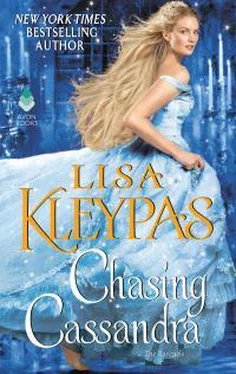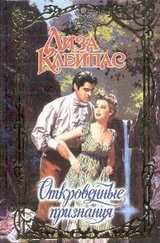“What makes you think he deserves it?” Tom asked curtly.
“Because you did,” she said quietly, letting go of him. “Every child does.”
And she went from the room quietly, leaving him to face his demons.
Cassandra knew it would take some time for Tom to come to terms with his past and the feelings he’d kept bottled up for so long. He might deny everything she’d said, or refuse to talk about it at all. She would have to be patient and understanding, and hope he would gradually come to acknowledge she had been right.
In the meantime, she would settle into her new home and start to build a life.
With her lady’s maid’s help, she spent the rest of the afternoon putting away her clothes, accessories, shoes, and the thousands of items necessary for a lady to be turned out properly. There was no sound from Tom’s connecting bedroom and sitting room. When Cassandra risked taking a peek, she discovered the bedroom was empty.
Perhaps he’d gone to his club, she thought with a touch of gloom, or a tavern, or some other place men went to avoid their wives. She hoped he would return for dinner. He wouldn’t be so inconsiderate as to miss dinner without telling her in advance, would he? Hadn’t there been something about that in the contract? Yes, she was positive there had been. If it turned out he’d violated their contract after one week of marriage, she was going to do something drastic. Crumple it up in front of him. No—she would set fire to it. Or maybe—
Her thoughts were interrupted by a gentle knock on the doorjamb. She glanced at the doorway, and her heart gave a few extra thumps as she saw her husband standing there, big and dark, with his hair slightly disheveled. “May I come in?” he asked quietly.
“Oh, yes,” Cassandra said, flustered. “You needn’t ask, just . . .” She turned to her lady’s maid. “Meg, if you wouldn’t mind.”
“Yes, my lady.” The lady’s maid moved a fabric-covered box of stockings from the bed to the dresser. As she passed Cassandra, her eyes glinted with mischief, and she said beneath her breath, “That dog’s going for a trot again.”
Cassandra frowned, and ushered her from the room.
Tom came in, bringing the scent of winter air and dry leaves with him. He leaned back against the dresser and slid his hands in his pockets, his expression unfathomable.
“You went for a walk?” Cassandra asked.
“I did.”
“I hope it was pleasant.”
“Not especially.” He took a long breath and blew it out slowly.
“Tom,” she said uneasily, “what I said before—”
“Feelings are inconvenient,” Tom said. “It’s why I decided to limit mine to five. For most of my adult life, it’s been easy to keep to that. Then I met you. Now my feelings have multiplied like rabbits, and I seem to have nearly as many as normal people do. Which is too many. However . . . if a man with the average brain can manage all these feelings well enough to function efficiently, I, with my powerful and superior brain, can as well.”
Cassandra nodded encouragingly, although she wasn’t quite sure what he was saying.
“Bazzle no longer has to be a hall boy,” he said. “He can sleep in a room on this floor of the house, and eat at our table. We’ll educate him as you see fit. I’ll raise him as . . . as mine.”
She heard him with a sense of wonder, having expected a long siege and instead been met with unanticipated surrender. For him to set aside his pride like this was not something to take lightly. Understanding the difficulty of the concession, and the changes he was going through, Cassandra went eagerly to press herself against his motionless form. “Thank you,” she said. His head eased down to her shoulder, and his arms stole around her.
“I didn’t make this decision to humor you,” Tom muttered. “You made some logical points I happened to agree with.”
Her fingers combed slowly through the fluid black layers of his hair. “And you care about him.”
“I wouldn’t necessarily put it that way. I just want him to be safe and comfortable and happy, and for no one to harm him.”
“That’s caring.”
Tom didn’t reply, but his arms tightened. After a long moment, he asked against her shoulder, “Are you going to reward me?”
Cassandra chuckled. “My body isn’t a prize for doing the right thing.”
“But it makes doing the right thing so much easier.”
“In that case . . .” Her hand caught one of his, and she pulled him toward the bed.
Chapter 26
Immediately upon their return from Jersey Island, Cassandra was beset by a torrent of calls, which she was then obligated to return. Tom was bemused by the complexity of the social rules his wife navigated so adeptly. She knew exactly when and how to call on people, and who received visits on which days. She knew which invitations could be refused, and which ones had to be accepted unless one was at death’s door. A bewildering variety of cards was required for this business of paying and receiving visits . . . individual cards for Tom and herself, a slightly larger card with both their names engraved on it, cards printed with their address and preferred receiving days, cards to be left after a chance visit, and cards to be left when no visit had been intended.
“Why would you go to someone’s house if you don’t want to see them?” Tom had asked.
“When you owe a friend a visit, but have no time to spend with her, you leave a card on the hall table to let her know you were there.”
“More precisely, you were there but didn’t want to see her.”
“Exactly.”
Tom didn’t bother trying to make sense of that, having accepted long ago that a small group of elevated individuals had decided to make human interaction as complicated and unnatural as possible. He didn’t mind that nearly as much as he minded the hypocrisy of a society that would condemn someone over a minor transgression, while letting one of its own off the hook for doing far worse.
He’d been disgusted—but hardly surprised—by the upper crust’s reaction to the London Chronicle ’s exposure of the Marquis of Ripon and his son, Lord Lambert, as vicious, lying bastards who’d intentionally tried to ruin Cassandra’s reputation. Ripon’s friends and associates had hastened to excuse his actions, and cast as much blame as possible on the young woman he had publicly humiliated.
The marquis had made an error in judgment, they had said, while he’d been distraught by the misbehavior of his son. Others had claimed it was a misunderstanding that, while unfortunate, had turned out well enough in the end. The wrongly accused Lady Cassandra had ended up married, they reasoned, so no real harm had been done.
It was generally agreed in elevated social circles that although the marquis’s behavior was regrettable, the lapse must be overlooked in a gentleman of such assured rank. Some people pointed out that Ripon had been punished enough by the embarrassment of his son’s infamous conduct, as well as the shadow cast over his own reputation. Therefore, the brunt of the blame was heaped on the absent Lord Lambert, who it seemed had decided to resume his grand tour of the continent for an indeterminate length of time. Ripon, for his part, would be welcomed back into the fold when the scandal had faded.
In the meantime, social mavens decided that no harm would come of paying calls to Lady Cassandra and her wealthy husband, and cultivating an advantageous association with them.
Tom would have liked to stick to his original plan of telling them all to go to hell, except that Cassandra seemed pleased by the visits. He would tolerate anything, no matter how galling, if it made her happy.
Since the age of ten, work had been the main part of Tom’s life, and home had been the place of brief but necessary intermissions, where he conducted the rituals of sleeping, eating, washing and shaving as efficiently as possible. Now, for the first time, he found himself plowing through his work so he could hurry back home, where all the interesting things seemed to be happening.
Читать дальше












